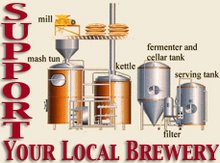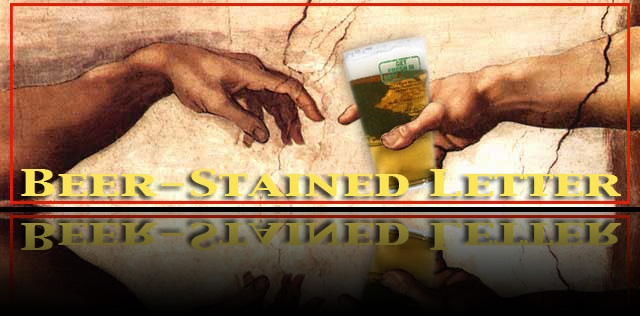 Something newsy that came out of River Horse during Shad Fest ...
Something newsy that came out of River Horse during Shad Fest ...
Co-owner Chris Walsh says RH fired off a letter to the state legislators who represent that chunk of Hunderton County that includes Lambertville.
The thrust of the letter, sent earlier this month, was an appeal to improve the business climate for brewers. You can pretty much frame that as a comparison to what freedoms brewers in Pennsylvania enjoy vs. New Jersey, namely that they can pull pints and sell cases and kegs, essentially acting as their own distributors within their premises, while of course here in the Garden State retail sales are capped at two six-packs or two growlers per person per visit to the brewery.
 It’s worth noting that while Pennsylvania breweries like Sly Fox, Stoudt’s and Victory can do that, they also put a lot of beer on the shelves in New Jersey. Sum that up as they enjoy multiple points of sale at home and successfully compete for shelf space in New Jersey with our brewers, whom the state chokes off such opportunities. So asking Trenton to level the playing field seems only fair.
It’s worth noting that while Pennsylvania breweries like Sly Fox, Stoudt’s and Victory can do that, they also put a lot of beer on the shelves in New Jersey. Sum that up as they enjoy multiple points of sale at home and successfully compete for shelf space in New Jersey with our brewers, whom the state chokes off such opportunities. So asking Trenton to level the playing field seems only fair.
None of this is new. For a long while, it’s been a sore spot for Jersey brewers, who’ve pointed to the freedoms that Garden State wineries enjoy, which sort of match what Pennsylvania brewers can do in their state. Greg Zaccardi at High Point Brewing in Butler has for some time argued this position and is in the process of putting pen to paper like River Horse has done. Meanwhile, folks at Cricket Hill haven’t been shy about discussing this topic. Just ask Rick Reed.
For River Horse’s part, it’s encouraging that the 23rd District lawmakers said they would take a look at the beer/brewer regulations. Let’s hope they agree that an update is in order, one that should be done with business growth in mind, and respond with some legislation.
 Let’s not forget what our cash-strapped state can come away with here – more revenue. Is it going to be a king’s ransom? Of course not, but New Jersey’s balance sheet is drowning in red ink, and it has been of little financial help to its towns and public schools for some time, as it tries to even out expenses vs income. So the state isn’t exactly in much of a position to be turning down an income source that’s both renewable and can be grown without having to jack up tax rates (like what's been proposed for liquor and wine taxes, and income taxes on wealthy people).
Let’s not forget what our cash-strapped state can come away with here – more revenue. Is it going to be a king’s ransom? Of course not, but New Jersey’s balance sheet is drowning in red ink, and it has been of little financial help to its towns and public schools for some time, as it tries to even out expenses vs income. So the state isn’t exactly in much of a position to be turning down an income source that’s both renewable and can be grown without having to jack up tax rates (like what's been proposed for liquor and wine taxes, and income taxes on wealthy people).
And part of that potential source, like we’ve been carping for a while, is the 7-cent sales tax, something everyone pays, so it’s not a regressive tax (like property taxes); it’s something that's evenly distributed. But there’s a wider picture, a trickle-down effect here, again as we’ve been saying a lot this year: Let the brewers sell more retail, beyond the minimum. The state will collect more in sales tax; breweries will move more beer, and if they move more beer, they’ll brew more beer, and the state collects more from the $3.72-per-barrel alcoholic beverage that tax brewers pay.
 No one loses here. Not even the distributors or retail outlets because the breweries must rely on them to widen their reach and develop markets. Buying beer at the brewery is a convenience for the hordes of people who enjoy brewhouse tours each year, or have developed supportive relationships with the beer-makers and like to stop by.
No one loses here. Not even the distributors or retail outlets because the breweries must rely on them to widen their reach and develop markets. Buying beer at the brewery is a convenience for the hordes of people who enjoy brewhouse tours each year, or have developed supportive relationships with the beer-makers and like to stop by.
And not to forget brewpubs ... They, as we’re saying yet again, should enjoy the opportunity to sign on with distributors and put their beer on the store shelves, provided they want to go to the investment expense to position themselves so. Conversely, production brewers should be allowed to also obtain brewpub licenses, and seek retail consumption licenses from their host municipalities (which can be a six- or seven-figure expense).
 By the by, if you support the state’s craft brewers, you don’t have to wait on their efforts to make this case. You can write your own district lawmakers and pitch the argument.
By the by, if you support the state’s craft brewers, you don’t have to wait on their efforts to make this case. You can write your own district lawmakers and pitch the argument.
It’s all about helping to trim the state’s bottom line and make the business climate fairer for the folks who make good beer for you.
 A reason to swing by Cricket Hill on Friday: good beer and good food, and cooking with good beer. Toss in music, too. This should be a great time (starts around 5 p.m.).
A reason to swing by Cricket Hill on Friday: good beer and good food, and cooking with good beer. Toss in music, too. This should be a great time (starts around 5 p.m.).

















